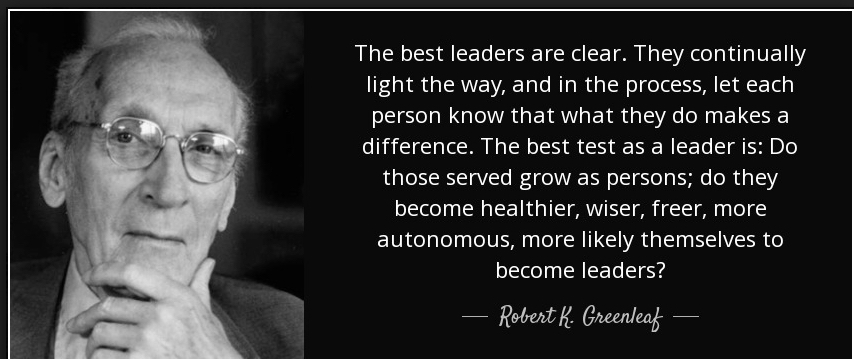The Servant Leader
For my regular GlobeBlog readers, I do believe an apology is in order: This Post has arrived to you two weeks late, and although I advised a couple of weeks ago that I was going to be spending an extra week completing research on this week's topic, my commitment is to have a new and interesting topic about how we humans work together (see the GlobeBlog's initial Post) every Monday morning.
By way of explanation, the 70-hour work weeks have hit me again, and it looks like I cannot avoid them until at least the end of March. In the future, during these types of cycles (because, I know I will always experience them from time to time), I will be offering up Guest Collections, where I provide a series of interesting Blog Posts around a certain topic or author.
So, without any further delay, let's talk about Servant Leadership, a topic that I became very interested in, but admittedly I hadn't heard much about it until the last few weeks.
Servant Leadership
In her Harvard Business Review Article on Servant Leadership, Carol A. Walker moves the discussion about Servant Leadership ahead by noting that new managers and leaders who are stepping into these types of roles for the first time would do well to develop "a clear philosophy" of how they will lead. As Ms. Walker says, this "...can provide a firm foundation from which to operate." Ms. Walker puts this into context by reminding us that:
With respect to your career, a philosophy is simply a cohesive way of thinking about your role. Very few people take the time to establish one. Most managers live in a reactive mode, responding to issues based on gut feelings, past experiences, and examples set by others. The success or failure of this approach is often determined by your temperament (some people are naturally more gifted managers than others) and the caliber of your role models—two factors largely out of your control.
Can anyone give me an "Amen"?
So how can this idea of Servant Leadership really help us? Robert Greenleaf first documented the concept more than four decades ago, but it is a concept that has been around for at lot longer. From an organizational management perspective, the concept means that, as Ms. Walker succinctly puts it:
When you have a servant mentality, it’s not about you. Removing self-interest and personal glory from your motivation on the job is the single most important thing you can do to inspire trust. When you focus first on the success of your organization and your team, it comes through clearly. You ask more questions, listen more carefully, and actively value others’ needs and contributions. The result is more thoughtful, balanced decisions. People who become known for inclusiveness and smart decisions tend to develop influence far more consistently than those who believe they have all the answers.
Sounds great, but how does this possibly work in practice -- you might ask?
I have been using this approach to managing for most of the last two decades (I just didn't realize it was called Servant Leadership) and it works like this: I facilitate. I do not dictate. I am very clear that the objective that I am working with my team on is the team's objective, and I am around to be "of service," essentially to help the team and the individual team members see their way ahead on their own. Generally speaking, they will need some sort of help along the way, and I will use my experience to help them help themselves. The team cannot be dragged to the finish line. They must get there on their own, and I am supposed to be their guide.
I know you are going to say this all sounds very "Zen," and in fact, in many ways, it is. But this is about getting stuff done, you say. Right. And, as I encourage and hopefully inspire team members to get to their end goals, along the way, we may have to have very direct and calm conversations about how certain things are not going well for certain team members. They will work with me to discover for themselves how they can be more successful in these specific areas, or they will generally -- and, in my experience, this is much more rare in the Servant Leadership model than in more autocratic models -- ask for an exit from the team. People -- myself included -- are generally much tougher on themselves than anyone else would be on them. One of your most important jobs as the Servant Leader is to help team members see the real data about their performance.
In summing up how a Servant Leader deals with "corrective Feedback," Carol Walker puts it this way:
Adopting the servant philosophy should also make it easier to provide corrective feedback. You are merely a facilitator, and facilitators aren’t angry, frustrated, or resentful when they deliver feedback, because it isn’t about them—it’s about the relationship between the two other parties. For that reason, exercising the servant frame of mind makes development conversations feel less personal. You aren’t disappointed in your employee’s actions; you are simply explaining how they get in the way of what he’s trying to accomplish for himself and the organization. When your only agenda is setting someone else up for success, your words tend to be received more openly.
For me, the Servant Leadership approach is the best way forward, and is particularly applicable to situations where I have little or no formal authority over those whom I am leading, which, for me, as a management consultant, is pretty much all the time; but even when you have formal authority over others, Servant Leadership might be worth looking at as a management philosophy because dictating to others is seldom the most effective way to lead.
Get new GlobeBlog Posts delivered directly to your email box. Sign-up for the BlueNotes Newsletter.

